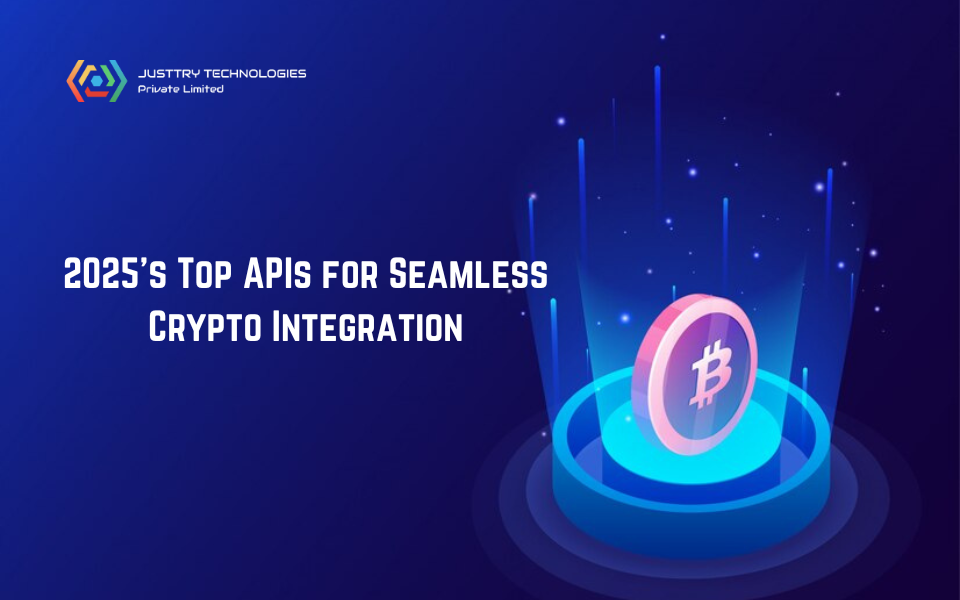Top 50 Cryptocurrency APIs for Developers: Harnessing the Power of Public APIs
Top 50 Cryptocurrency APIs for Developers: Harnessing the Power of Public APIs
In the rapidly growing world of cryptocurrencies and blockchain, developers need seamless access to reliable tools to build innovative applications such as wallets, trading platforms, decentralized apps (dApps), and analytics tools. Cryptocurrency APIs (Application Programming Interfaces) are indispensable, providing developers with pre-built tools to interact with blockchain networks, fetch market data, and execute transactions efficiently.
Public cryptocurrency APIs simplify access to blockchain features, enabling developers to focus on innovation rather than infrastructure. This guide explores 50 top cryptocurrency APIs, their features, and their use cases, helping you choose the right tools for your project.
What Are Cryptocurrency APIs?
Cryptocurrency APIs are software interfaces that allow developers to connect with blockchain networks and cryptocurrency services. These APIs provide access to real-time data, wallet management, blockchain analytics, and more.
Key Features of Cryptocurrency APIs:
Real-time market data and price tracking
Blockchain transaction and wallet management
Smart contract deployment and interaction
Multi-blockchain support for cross-chain applications
Trading functionalities for exchanges
Why Public Cryptocurrency APIs Are Vital for Developers
Simplified Blockchain Access
Public APIs remove the need to set up complex blockchain infrastructure, offering easy access to blockchain networks.
Real-Time Data
They provide real-time updates on prices, transactions, and trends, enabling developers to create responsive applications.
Cost and Time Efficiency
Pre-built APIs save time and resources, eliminating the need to build functionalities from scratch.
Scalability
Designed to handle growing user demands, APIs ensure that your application remains responsive as it scales.
Top 50 Cryptocurrency APIs for Developers
Market Data APIs
CoinGecko API: Offers price data and market insights for thousands of cryptocurrencies.
CoinMarketCap API: Provides rankings and detailed market trends.
Nomics API: Offers real-time and historical market data.
CryptoCompare API: Covers prices, trading volumes, and news aggregation.
Messari API: Advanced data for financial modeling.
Blockchain Transaction APIs
Blockchain.com API: Tracks Bitcoin transactions and wallet balances.
BlockCypher API: Supports multi-blockchain operations.
NOWNodes API: Access to nodes for 50+ networks.
Bitquery API: Facilitates blockchain data querying.
Etherscan API: Ethereum block and transaction data.
Wallet Management APIs
Coinbase API: Manages wallets and cryptocurrency payments.
Tatum API: Wallet creation and blockchain transactions for 40+ networks.
Gemini API: Secure wallet integration.
BitGo API: Enterprise-grade wallet solutions.
Celo API: Focused on decentralized finance (DeFi).
Trading APIs
Binance API: Real-time market data and trading functionalities.
Kraken API: Trading and portfolio tracking.
Bitfinex API: Advanced trading tools and historical data.
Huobi API: Access to liquidity pools.
Coinbase Pro API: Institutional-grade trading tools.
Smart Contract APIs
Alchemy API: Simplifies Ethereum smart contract deployment.
Moralis API: Cross-blockchain smart contract interaction.
Infura API: Ethereum and IPFS connectivity.
Chainlink API: Oracle services for secure data integration.
0x API: Tools for decentralized exchanges.
Cross-Chain and Interoperability APIs
1inch API: Aggregates decentralized exchange liquidity.
Polkadot API: Blockchain interoperability.
Cosmos API: Blockchain communication within the Cosmos network.
Ripple API: Cross-border payments.
Hyperledger Fabric API: Enterprise-grade blockchain solutions.
Specialized APIs
The Graph API: Blockchain querying for dApps.
Aave API: DeFi lending tools.
Uniswap API: Liquidity pool data.
OpenSea API: NFT marketplace tools.
QuickNode API: Blockchain node services.
Choosing the Right API for Your Project
When selecting an API, consider:
Blockchain Compatibility: Ensure support for your chosen blockchain.
Features: Match functionalities to your project needs.
Security: Opt for APIs with strong encryption.
Scalability: Ensure the API can handle increased traffic.
Conclusion
Cryptocurrency APIs have revolutionized blockchain development, empowering developers to build applications faster and more efficiently. Whether you’re creating wallets, dApps, or analytics platforms, these APIs cater to diverse needs. Select the best API for your project and start building the next big thing in crypto.
Visit :
https://justtrytech.com/cryptocurrency-exchange-development-company/
#cryptodevelopmentcompany #cryptosoftwaredevelopment #cryptoplatformdevelopmentTop 50 Cryptocurrency APIs for Developers: Harnessing the Power of Public APIs
Top 50 Cryptocurrency APIs for Developers: Harnessing the Power of Public APIs
In the rapidly growing world of cryptocurrencies and blockchain, developers need seamless access to reliable tools to build innovative applications such as wallets, trading platforms, decentralized apps (dApps), and analytics tools. Cryptocurrency APIs (Application Programming Interfaces) are indispensable, providing developers with pre-built tools to interact with blockchain networks, fetch market data, and execute transactions efficiently.
Public cryptocurrency APIs simplify access to blockchain features, enabling developers to focus on innovation rather than infrastructure. This guide explores 50 top cryptocurrency APIs, their features, and their use cases, helping you choose the right tools for your project.
What Are Cryptocurrency APIs?
Cryptocurrency APIs are software interfaces that allow developers to connect with blockchain networks and cryptocurrency services. These APIs provide access to real-time data, wallet management, blockchain analytics, and more.
Key Features of Cryptocurrency APIs:
Real-time market data and price tracking
Blockchain transaction and wallet management
Smart contract deployment and interaction
Multi-blockchain support for cross-chain applications
Trading functionalities for exchanges
Why Public Cryptocurrency APIs Are Vital for Developers
Simplified Blockchain Access
Public APIs remove the need to set up complex blockchain infrastructure, offering easy access to blockchain networks.
Real-Time Data
They provide real-time updates on prices, transactions, and trends, enabling developers to create responsive applications.
Cost and Time Efficiency
Pre-built APIs save time and resources, eliminating the need to build functionalities from scratch.
Scalability
Designed to handle growing user demands, APIs ensure that your application remains responsive as it scales.
Top 50 Cryptocurrency APIs for Developers
Market Data APIs
CoinGecko API: Offers price data and market insights for thousands of cryptocurrencies.
CoinMarketCap API: Provides rankings and detailed market trends.
Nomics API: Offers real-time and historical market data.
CryptoCompare API: Covers prices, trading volumes, and news aggregation.
Messari API: Advanced data for financial modeling.
Blockchain Transaction APIs
Blockchain.com API: Tracks Bitcoin transactions and wallet balances.
BlockCypher API: Supports multi-blockchain operations.
NOWNodes API: Access to nodes for 50+ networks.
Bitquery API: Facilitates blockchain data querying.
Etherscan API: Ethereum block and transaction data.
Wallet Management APIs
Coinbase API: Manages wallets and cryptocurrency payments.
Tatum API: Wallet creation and blockchain transactions for 40+ networks.
Gemini API: Secure wallet integration.
BitGo API: Enterprise-grade wallet solutions.
Celo API: Focused on decentralized finance (DeFi).
Trading APIs
Binance API: Real-time market data and trading functionalities.
Kraken API: Trading and portfolio tracking.
Bitfinex API: Advanced trading tools and historical data.
Huobi API: Access to liquidity pools.
Coinbase Pro API: Institutional-grade trading tools.
Smart Contract APIs
Alchemy API: Simplifies Ethereum smart contract deployment.
Moralis API: Cross-blockchain smart contract interaction.
Infura API: Ethereum and IPFS connectivity.
Chainlink API: Oracle services for secure data integration.
0x API: Tools for decentralized exchanges.
Cross-Chain and Interoperability APIs
1inch API: Aggregates decentralized exchange liquidity.
Polkadot API: Blockchain interoperability.
Cosmos API: Blockchain communication within the Cosmos network.
Ripple API: Cross-border payments.
Hyperledger Fabric API: Enterprise-grade blockchain solutions.
Specialized APIs
The Graph API: Blockchain querying for dApps.
Aave API: DeFi lending tools.
Uniswap API: Liquidity pool data.
OpenSea API: NFT marketplace tools.
QuickNode API: Blockchain node services.
Choosing the Right API for Your Project
When selecting an API, consider:
Blockchain Compatibility: Ensure support for your chosen blockchain.
Features: Match functionalities to your project needs.
Security: Opt for APIs with strong encryption.
Scalability: Ensure the API can handle increased traffic.
Conclusion
Cryptocurrency APIs have revolutionized blockchain development, empowering developers to build applications faster and more efficiently. Whether you’re creating wallets, dApps, or analytics platforms, these APIs cater to diverse needs. Select the best API for your project and start building the next big thing in crypto.
Visit :
https://justtrytech.com/cryptocurrency-exchange-development-company/
#cryptodevelopmentcompany #cryptosoftwaredevelopment #cryptoplatformdevelopment













